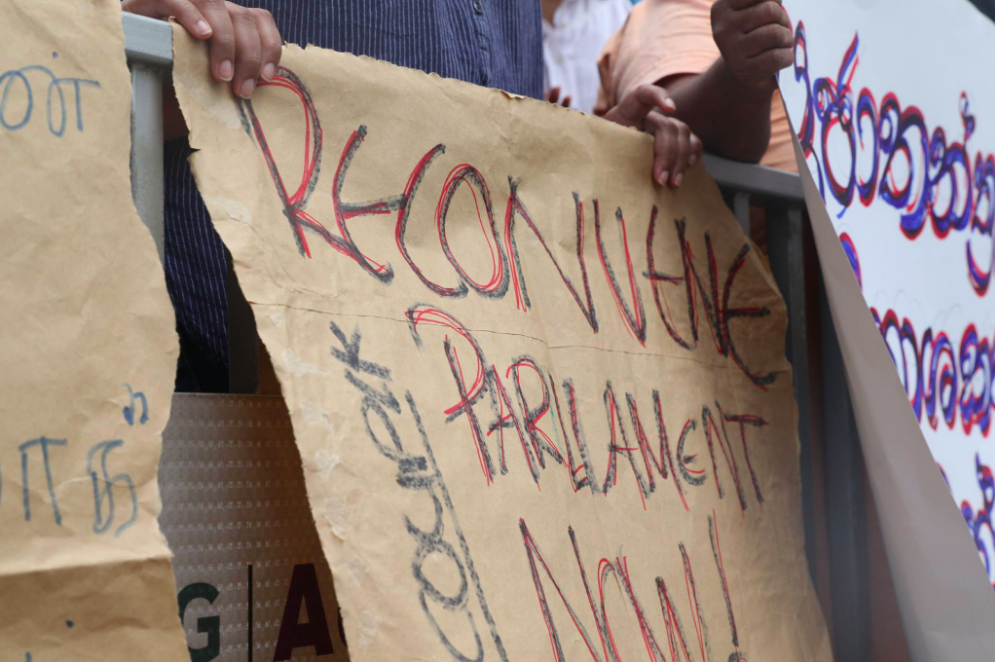Featured image courtesy Vikalpa
On October 26, news broke that the United People’s Freedom Alliance (UPFA) had withdrawn from the coalition government. Shortly after, SLPP MP Mahinda Rajapaksa was sworn in as Prime Minister by President Sirisena.
Prime Minister Ranil Wickremesinghe refused to vacate his post. Both Wickremesinghe and Rajapaksa contended that they commanded the majority vote. However, before a floor vote could be called, President Sirisena prorogued Parliament.
The events on October 26 has led to protests from citizens, rival political parties and legal analysts, who say Sirisena’s move runs completely counter to the 19th amendment of the constitution, which specifically provides for when a Prime Minister ceases to hold office. Revealingly, Attorney General Jayantha Jayasuriya has also refused to express an opinion on the legality of the move, saying it would be ‘deemed inappropriate’ – the strongest signal to date, from the State’s chief legal adviser that the events of October 26 were unconstitutional.
In the immediate aftermath, the heads of State-owned media have been replaced.
Confusion reigned on November 1, with several contradictory dates being given for the re-convening of Parliament. Initially, Prime Minister Wickremesinghe tweeted that Parliament was being convened on November 5, but the BBC quoted President Sirisena as saying no such decision had been taken. UPFA MP Mahindananda Aluthgamage in a press conference noted that Parliament would be convened on November 16. This morning (November 2) Speaker Karu Jayasuriya said Parliament would convene on November 7.
Sirisena’s move has also been met with deep concern in the international community – since last Friday, Norway, Australia, the European Union, the US, Canada and India, the United Nations and The Elders have issued statements, all of them urging for Parliament to reconvene.
Significantly, a week hence, only the envoys from China and Burundi have acknowledged Rajapaksa’s appointment – the silence from the rest of the community is telling.
The governments of Canada and Australia, the UK Foreign Commonwealth Office and the US State Department have issued travel advisories to the country in anticipation of unrest resulting from political turmoil.
The European Union has reportedly considered stripping Sri Lanka of its duty-free access if it backtracks on its commitment to rights, considering the wartime abuses that happened on Rajapaksa’s watch as president.
The following is a compilation of content that has been published over the course of the last week. This list will be updated regularly as the situation develops.
Twitter Moments
Collections of Tweets around key aspects of the conversation around the current political situation.
- Constitutional Crisis in #SriLanka
- Citizens protest the #ConstitutionalCrisisSriLanka
- #ConstitutionalCrisisSriLanka: On the reconvening of Parliament
Infographics: Short quotes
Facebook Album
Excerpts from Nailing Canards: Why President Sirisena’s Actions Remain Illegal, Unconstitutional, And Illegitimate – debunking false arguments made in public debates around the Constitution
Facebook Album
Civil Society protest on Reconvening Parliament
Articles
- Paradise Lost? Preliminary Notes on a Constitutional Coup , by Asanga Welikala
- What Is At Stake Is Democracy Itself, by Tisaranee Gunasekara
- A Land Like No Other, by Sasanka Perera
- Nailing Canards: Why President Sirisena’s Actions Remain Illegal, Unconstitutional, And Illegitimate, by Asanga Welikala
- A Coup in Sri Lanka’s Democracy: A Statement by Sri Lankan Students
- Of Constitutions, Cabinets and Coups, by Sanjit Dias
Resources
Roundup of official statements and press releases on the crisis
The events since October 26 have also seen the spread of misinformation, both online and off. Groundviews has been following the situation closely. Access the following tools on media literacy: Infographics: how to identify misinformation, photo and video verification
Key links, social media recommendations and resources are available at this page. It will be updated regularly: A Constitutional Crisis in Sri Lanka – Updates, Analysis and Insights
For regular updates on the situation as it unfolds, our WhatsApp group is a valuable source of information. Members of our groups include diplomats, researchers, current and former members of Government and lawyers.
To be added to the group, please send a message to +94771103076.
Download this as a PDF here.
